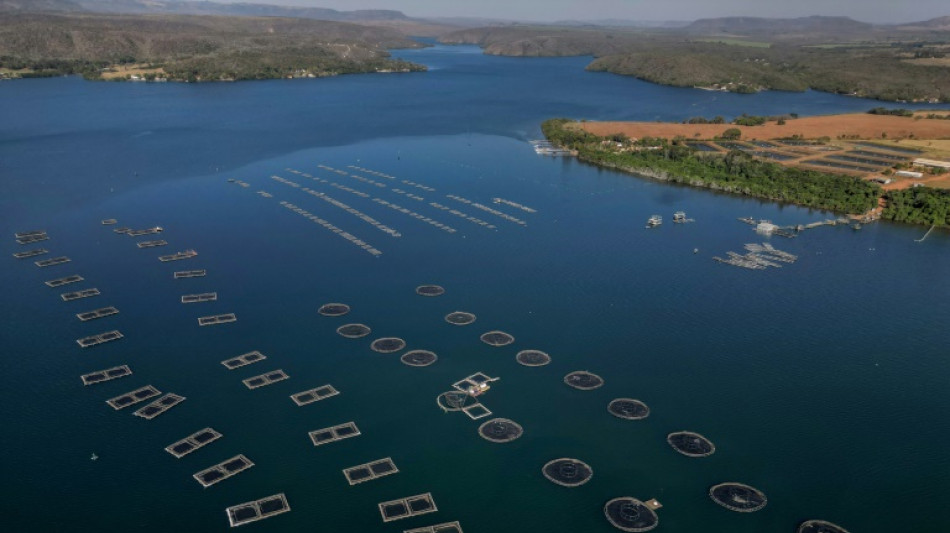
-
 Star designer Rousteing quits fashion group Balmain
Star designer Rousteing quits fashion group Balmain
-
Mexico's Sheinbaum steps up cartel fight after murder of anti-narco mayor

-
 Attack on funeral in Sudan's Kordofan region kills 40: UN
Attack on funeral in Sudan's Kordofan region kills 40: UN
-
Key PSG trio set for spell on sidelines

-
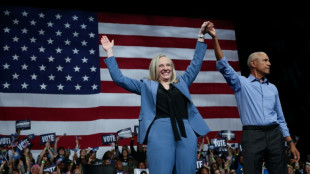 Democrats punch back in US elections - and see hope for 2026
Democrats punch back in US elections - and see hope for 2026
-
BMW reports rising profitability, shares jump

-
 US Supreme Court debates legality of Trump's tariffs
US Supreme Court debates legality of Trump's tariffs
-
Bolivia Supreme Court orders release of jailed ex-president Jeanine Anez
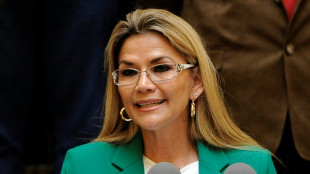
-
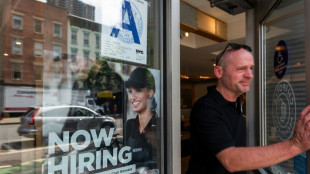 Wall Street stocks rise after positive jobs data
Wall Street stocks rise after positive jobs data
-
'Hostage diplomacy': longstanding Iran tactic presenting dilemma for West

-
 Rybakina stays perfect at WTA Finals with win over alternate Alexandrova
Rybakina stays perfect at WTA Finals with win over alternate Alexandrova
-
Le Garrec welcomes Dupont help in training for Springboks showdown

-
 Brussels wants high-speed rail linking EU capitals by 2040
Brussels wants high-speed rail linking EU capitals by 2040
-
Swiss business chiefs met Trump on tariffs: Bern
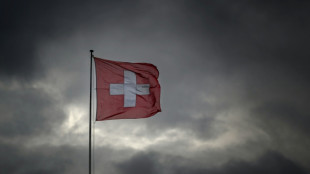
-
 At least 9 dead after cargo plane crashes near Louisville airport
At least 9 dead after cargo plane crashes near Louisville airport
-
France moves to suspend Shein website as first store opens in Paris

-
 Spain's exiled king recounts history, scandals in wistful memoir
Spain's exiled king recounts history, scandals in wistful memoir
-
Wall Street stocks steady after positive jobs data
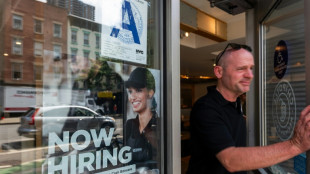
-
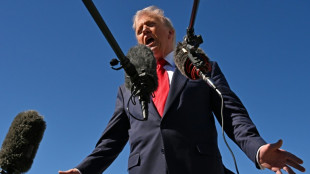 Trump blasts Democrats as government shutdown becomes longest ever
Trump blasts Democrats as government shutdown becomes longest ever
-
Indian pilgrims find 'warm welcome' in Pakistan despite tensions

-
 Inter and AC Milan complete purchase of San Siro
Inter and AC Milan complete purchase of San Siro
-
Swedish authorities inspect worksite conditions at steel startup Stegra

-
 Keys withdraws from WTA Finals with illness
Keys withdraws from WTA Finals with illness
-
Prince Harry says proud to be British despite new life in US

-
 BMW boosts profitability, welcomes Nexperia signals
BMW boosts profitability, welcomes Nexperia signals
-
EU strikes last-ditch deal on climate targets as COP30 looms

-
 Stocks retreat as tech bubble fears grow
Stocks retreat as tech bubble fears grow
-
Shein opens first permanent store amid heavy police presence

-
 West Indies edge New Zealand despite Santner brilliance
West Indies edge New Zealand despite Santner brilliance
-
French pair released by Iran await return home

-
 German factory orders up but outlook still muted
German factory orders up but outlook still muted
-
Death toll tops 100 as Philippines digs out after typhoon

-
 Attack on key city in Sudan's Kordofan region kills 40: UN
Attack on key city in Sudan's Kordofan region kills 40: UN
-
'No one could stop it': Sudanese describe mass rapes while fleeing El-Fasher

-
 Champagne and cheers across New York as Mamdani soars to victory
Champagne and cheers across New York as Mamdani soars to victory
-
Medieval tower collapse adds to Italy's workplace toll

-
 BMW boosts profitability despite China, tariff woes
BMW boosts profitability despite China, tariff woes
-
South Africa's Wiese wary of 'hurt' France before re-match

-
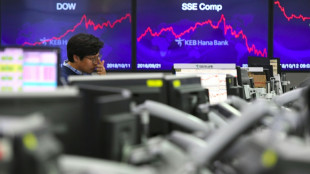 Asian markets sink as tech bubble fears grow
Asian markets sink as tech bubble fears grow
-
Beyond limits: Croatian freediver's breathtaking record

-
 Tottenham supporting Udogie after alleged gun threat in London
Tottenham supporting Udogie after alleged gun threat in London
-
Thunder roll Clippers to stay unbeaten as SGA keeps streak alive

-
 In appeal, Australian mushroom murderer alleges 'miscarriage of justice'
In appeal, Australian mushroom murderer alleges 'miscarriage of justice'
-
Toyota hikes profit forecasts 'despite US tariffs'

-
 Typhoon death toll soars past 90 in the Philippines
Typhoon death toll soars past 90 in the Philippines
-
Ex-France lock Willemse challenges Meafou to become 'the bully'

-
 Ukrainians to honour sporting dead by building country they 'died for': minister
Ukrainians to honour sporting dead by building country they 'died for': minister
-
At least 7 dead after UPS cargo plane crashes near Louisville airport

-
 US Supreme Court hears challenge to Trump tariff powers
US Supreme Court hears challenge to Trump tariff powers
-
US government shutdown becomes longest in history


Trump's tariffs drown Brazil's fish industry
When the water pump is switched on, hundreds of tilapia come to the surface of a pond at a Brazilian fish farm. Their final destination is now uncertain because of US President Donald Trump's stiff tariffs.
Fish are one of the Brazilian products subject to a whopping 50 percent levy imposed by Washington a week ago -- a stunning blow to the industry, which now fears layoffs, given that 60 percent of its exports go to the United States.
Fider Pescados, Brazil's second biggest exporter of tilapia, manages 400 fish ponds along the Rio Grande in the southeastern state of Sao Paulo, the country's most populous and richest.
Tilapia raised there are processed at a company factory in Rifaina, a small town of 4,000 residents.
Before the new wave of tariffs, 40 percent of the 9,600 tonnes of fish produced annually by Fider Pescados was shipped to the United States. Now, exports have already plummeted by a third.
"We're expecting sales to the US to bottom out, as the 50 percent tariff is untenable," company director Juliano Kubitza told AFP.
Once hatched, it takes eight months for farm-raised tilapia -- a mild white fish -- to reach supermarket shelves.
"This isn't like the production cycle for chicken -- that only takes 40 days and so you can recalibrate" the production schedule, explained Kubitza, whose company employs 500 people.
"In the fish industry, it's like a moving train -- you can't hit the brakes too suddenly."
Kubitza is now in a race against time to find new markets for his product, and he is under no illusions that it will be easy.
"No other country consumes as much (tilapia) as the United States," he said.
- 'Hammer blow' -
Sergio Secco, a 43-year-old team leader in Fider Pescados' fish ponds, knows that he is at serious risk of losing his job.
"I told the younger staff that tariffs would be a hammer blow. Whether we want it or not, it will have consequences on production and jobs, as we export a huge amount" to the US market, he said.
Some 20,000 employees in Brazil's fish industry "could be laid off or made redundant by staff cuts," warned the Brazilian Fish Industry Association.
While Fider Pescados has not talked about cutting any jobs so far, Rafaela Ferreira do Nascimento, a 26-year-old who prepares tilapia filets for export in the Rifaina factory, admitted she is "a bit afraid" to find herself without work.
In the short term, the company cannot let anyone go. Staff cuts would prevent it from handling all of the fish ready for harvesting.
- Search for new markets -
Once a fish reaches a certain weight, it must be taken to the factory for processing before being shipped -- fresh or frozen.
US buyers mainly purchase fresh tilapia, which is sold at a higher profit margin.
"If the tariffs cut into exports, we will have to freeze some products" that were intended to be sold fresh, said production supervisor Samuel Araujo Carvalho.
"Few other countries could buy fresh fish from us," said Kubitza, who hopes to boost sales at home, which already account for 50 percent of total production.
But those domestic sales would fetch a far lower price than the company intended to charge before the tariffs kicked in.
"Since the tariff hike, they are offering us sale prices, but before they were too expensive, and now I don't plan to buy from them," said one restaurant owner in Rifaina, on condition of anonymity.
As it looks for new markets, Fider Pescados has been forced to put on hold a planned expansion, which would have allowed it to increase production by 35 percent.
Z.Ramadan--SF-PST
